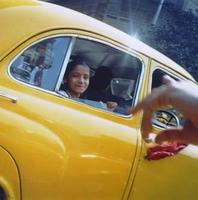
Having had a hectic day and sporting a terrific headache and an overwhelming urge to make my way home for dinner, red wine and sympathy I found myself crammed on the DLR heading for Bank. I'd arranged to meet a friend who had been travelling for the summer and had reserved us tickets to see a film at the ICA. Couldn't remember the name of the film and given the mood I was in it was sure to be some arty, high-brow production which I would be incapable of understanding.
The Central Line platform was full to bursting and the helpful man on the tannoy was just informing us that 'due to the earlier suspension the service was returning to normal'. 15 minutes for the next tube. My shoulders sagged and my body groaned. Surprisingly, few people made for the exit. Did they really think they would be able to get on the train once it did arrive?
There was a glimmer of hope as I boarded a bus bound for Tottenham Court Road almost immediately. Somewhere between its destination and Holborn we became well and truly stuck in a bus jam. Not having moved for at least 5 minutes there seemed nothing for it but to get off and use the most reliable form of transport known to man Shanks's pony.
As you may well imagine by the time I had walked to Coffea in Brewer Street I was seething. Fortunately, the waitress in the cheap Japanese down the road clearly understood my plight and brought me a far taller bottle of beer than the one I had ordered. Accompanied by G's stories of Vietnam and Cambodia I soon started relaxing.
I checked the name of the film I was going to see. Born Into Brothels. Surely she wasn't taking me to see something verging on the pornographic? No. Born Into Brothels is an award-winning documentary based on children born in the red light district of Calcutta.
Zana Briski, an American photographer, lived amongst the women periodically in the hope they would let her document their lives. It was the children of the prostitutes who held her attention. Briski gave them simple cameras and over a period of three years taught them how to use them; to show the world through their own eyes.
I came out feeling like I'd been run over by a steamroller. The film was at times heart-breaking, distressing, touching and funny. We were unable to dissect it then and there. Time was needed to sit and contemplate before discussing.
Ten or so days on I'm still undecided. It's an amazingly powerful film and people should watch it. On the other hand, I wonder how it has affected the lives of the children. Briski was determined to help these children lead better lives; to ensure the girls didn't follow their mothers, grandmothers and aunts 'into the line'. She showed them the world outside but was it really attainable? She fought red tape and prejudice to get some of the kids places in schools. At the end of the film only two had stayed on. The others had been withdrawn by their families or had chosen to go home.
What Briski set out to do was commendable but did it smack of the Sally Army trying to rescue fallen women's children in the 19th Century? Is it better to have tried to improve their lives and fail than not to try at all? I don't know the answers. Go watch the film and make your own mind up.
http://www.kids-with-cameras.org/mission/
